#Russian Criminal Procedures Code
Explore tagged Tumblr posts
Text
In 1968, the American scholar Jerome M. Gilison described Soviet elections as a “psychological curiosity”—a ritualized, performative affirmation of the regime rather than a real vote in any sense of the word. These staged elections with their nearly unanimous official results, Gilison wrote, served to isolate non-conformists and weld the people to their regime.
Last Sunday, Russia completed the circle and returned to Soviet practice. State election officials reported that 87 percent of Russians had cast their vote for Vladimir Putin in national elections, giving the Russian president a fifth term in office. Not only were many of the reported election numbers mathematically impossible, but there was also no longer much of a choice: All prominent opposition figures had been either murdered, imprisoned, or exiled. Like in Soviet times, the election also welded Russians to their regime by serving as a referendum on Putin’s war against Ukraine. All in all, last weekend’s Soviet-style election sealed Putin’s transformation of post-Communist Russia into a repressive society with many of the features of Soviet totalitarianism.
Russia’s return to Soviet practice goes far beyond elections. A recent study by exiled Russian journalists from Proekt Media used data to determine that Russia is more politically repressive today than the Soviet Union under all leaders since Joseph Stalin. During the last six years, the study reports, the Putin regime has indicted 5,613 Russians on explicitly political charges—including “discrediting the army,” “disseminating misinformation,” “justification of terrorism,” and other purported crimes, which have been widely used to punish criticism of Russia’s war on Ukraine and justification of Ukraine’s defense of its territory. This number is significantly greater than in any other six-year period of Soviet rule after 1956—all the more glaring given that Russia’s population is only half that of the Soviet Union before its collapse.
In addition to repressive criminal charges and sentences, over the last six years more than 105,000 people have been tried on administrative charges, which carry heavy fines and compulsory labor for up to 30 days without appeal. Many of these individuals were punished for taking part in unsanctioned marches or political activity, including anti-war protests. Others were charged with violations of COVID pandemic regulations. Such administrative punishments are administered and implemented rapidly, without time for an appeal.
On March 4, 2022, a little over a week after the Russian invasion of Ukraine began, Russia’s puppet parliament rapidly adopted amendments to the Russian Criminal Code and Criminal Procedure Code that established criminal and administrative punishments for the vague transgressions of “discrediting” the Russian military or disseminating “false information” about it. This widely expanded the repressive powers of the state to criminally prosecute political beliefs and activity. Prosecutions have surged since the new laws were passed, likely leading to a dramatic increase in the number of political prisoners in the coming years. In particular, punishments for “discrediting the army” or “justification of terrorism”—which includes voicing support for Ukraine’s right to defend itself—have resulted in hundreds of sentences meted out each year since the war began. The most recent such case: On Feb. 27, the 70-year-old co-chairman of the Nobel Peace Prize-winning human rights group Memorial, Oleg Orlov, was sentenced to two and a half years in prison for “discrediting” the Russian military.
As the Proekt report ominously concludes, “[I]n terms of repression, Putin has long ago surpassed almost all Soviet general secretaries, except for one—Joseph Stalin.” While this conclusion is in itself significant, it is only the tip of the iceberg of the totalitarian state Putin has gradually and systematically rebuilt.
As in the Soviet years, there is no independent media in Russia today. The last of these news organizations were banned or fled the country after Putin’s all-out war on Ukraine, including Proekt, Meduza, Ekho Moskvy, Nobel Prize-winning Novaya Gazeta, and TV Dozhd. In their place, strictly regime-aligned newspapers, social media, and television and radio stations emit a steady drumbeat of militaristic propaganda, promote Russian imperialist grandeur, and celebrate Putin as the country’s infallible commander in chief. In another reprise of totalitarian practice, lists of banned books have been dramatically expanded and thousands of titles have been removed from the shelves of Russian libraries and bookstores. Bans have been extended to numerous Wikipedia pages, social media channels, and websites.
Human rights activists and independent civic leaders have been jailed, physically attacked, intimidated into silence, or driven into exile. Civic organizations that show independence from the state are banned as “undesirable” and subjected to fines and prosecution if they continue to operate. The most recent such organizations include the Andrei Sakharov Foundation, Memorial, the legendary Moscow Helsinki Group, and the EU-Russia Civil Society Forum. In their place, the state finances a vast array of pro-regime and pro-war groups, with significant state resources supporting youth groups that promote the cult of Putin and educate children in martial values to prepare them for military service. Then there are the numerous murders of opposition leaders, journalists, and activists at home and abroad. Through these various means, almost all critical Russian voices have been silenced.
Private and family life is also increasingly coming under the scope of government regulation and persecution. The web of repression particularly affects the LGBT community, putting large numbers of Russians in direct peril. A court ruling in 2023 declared the “international LGBT movement” extremist and banned the rainbow flag as a forbidden symbol, which was quickly followed by raids and arrests. Homosexuality has been reclassified as an illness, and Russian gay rights organizations have shut down their operations for fear of prosecution. Legislation aimed at reinforcing “traditional values”—including the right of husbands to discipline their wives—has led to the reduction in sentences and the decriminalization of some forms of domestic violence.
Many of the techniques of totalitarian control now operating throughout Russia were first incubated in territories where the Kremlin spread war and conflict. Chechnya was the first testing ground for widespread repression, including massive numbers of victims subjected to imprisonment, execution, disappearance, torture, and rape. Coupled with the merciless targeting of civilians in Russia’s two wars in Chechnya, these practices normalized wanton criminal behavior within Russian state security structures. Out of this crucible of fear and intimidation, Putin has shaped a culture and means of governing that were further elaborated in other places Russia invaded and eventually came to Russia itself.
In Russian-occupied Crimea and eastern Ukraine since 2014, there has been a widespread campaign of surveillance, summary executions, arrests, torture, and intimidation—all entirely consistent with Soviet practice toward conquered populations. More recently, this includes the old practice of forced political recantations: A Telegram channel ominously called Crimean SMERSH (a portmanteau of the Russian words for “death to spies,” coined by Stalin himself) has posted dozens of videos of frightened Ukrainians recanting their Ukrainian identity or the display of Ukrainian symbols. Made in conjunction with police operations, these videos appear to be coordinated with state security services.
In the parts of Ukraine newly occupied since 2022, human rights groups have widely documented human rights abuses and potential war crimes. These include the abduction of children, imprisonment of Ukrainians in a system of filtration camps that recall the Soviet gulags, and the systematic use of rape and torture to break the will of Ukrainians. Castrations of Ukrainian men have also been employed.
As Russia’s violence in Ukraine has expanded, so, too, has the acceptance of these abominations throughout the state and in much of society. As during the Stalin era, the cult of cruelty and the culture of fear are now the legal and moral standards. The climate of fear initially employed to assert order in occupied regions is now being applied to Russia itself. In this context, the murder of Alexei Navalny ahead of the presidential election was an important message from Putin to the Russian people: There is no longer any alternative to the war and repressive political order he has imposed, of which Navalny’s elimination is a part.
All the techniques and means of repression bespeak a criminal regime that now closely resembles the totalitarian rule of Stalin, whom Putin now fully embraces. After Putin first came to power in 1999, he often praised Stalin as a great war leader while disapproving of his cruelty and brutality. But as Putin pivoted toward war and repression, Russia has systematically promoted a more positive image of Stalin. High school textbooks not only celebrate his legacy but also whitewash his terror regime. There has been a proliferation of new Stalin monuments, with more than 100 throughout the country today. On state-controlled media, Russian propagandists consistently hammer away on the theme of Stalin’s greatness and underscore similarities between his wartime leadership and Putin’s. Discussion of Stalinist terror has disappeared, as has the memorialization of his millions of victims. Whereas only one in five Russians had a positive view of Stalin in the 1990s, polls conducted over the last five years show that number has risen to between 60 percent and 70 percent. In normalizing Stalin, Putin is not glossing over the tyrant’s crimes; rather, he is deliberately normalizing Stalin as a justification for his own war-making and repression.
Putin now resembles Stalin more closely than any other Soviet or Russian leader. Unlike Nikita Khrushchev, Leonid Brezhnev, Konstantin Chernenko, and Yuri Andropov—not to mention Mikhail Gorbachev and Boris Yeltsin—Putin has unquestioned power that is not shared or limited in any way by parliament, courts, or a Politburo. State propaganda has created a Stalin-like personality cult that lionizes Putin’s absolute power, genius as a leader, and role as a brilliant wartime generalissimo. It projects him as the fearsome and all-powerful head of a militarized nation aiming, like Stalin, to defeat a “Nazi” regime in Ukraine and reassert hegemony over Eastern and Central Europe. Just as Stalin made effective use of the Russian Orthodox Church to support Russia’s effort during World War II, Putin has effectively used Russian Orthodox Patriarch Kirill as a critical ally and cheerleader of Russia’s brutal war in Ukraine. And just like Stalin, Putin has made invading neighboring countries and annexing territory a central focus of the Kremlin’s foreign policy.
Putin’s descent into tyranny has been accompanied by his gradual isolation from the rest of society. Like the latter-day Stalin, Putin began living an isolated life as a bachelor even before the COVID-19 pandemic hit. Like the later Stalin, Putin lacks a stable family life and is believed to have replaced it with a string of mistresses, some of whom are reported to have borne him children for whom he remains a remote figure. Like Stalin, he stays up late into the early-morning hours, and like the Soviet dictator, Putin has assembled around him a small coterie of trusted intimates, mostly men in their 60s and 70s, with whom he has maintained friendships for decades, including businessmen Yury Kovalchuk and Igor Sechin, Defense Minister Sergei Shoigu, and security chief Nikolai Patrushev. This coterie resembles Stalin’s small network of cronies: security chief Lavrentiy Beria, military leader Kliment Voroshilov, and Communist Party official Georgy Malenkov. To others in leadership positions, Putin is a distant, absolute leader who openly humiliates seemingly powerful officials, such as spy chief Sergey Naryshkin, when the latter seemed to hesitate in his support during Putin’s declaration of war on Ukraine.
Through near-total control of domestic civic life and media, his widening campaign of repression and terror, relentless state propaganda promoting his personality cult, and his vast geopolitical ambitions, Putin is consciously mimicking the Stalin playbook, especially the parts of that playbook dealing with World War II. Even if Putin has no love for Soviet Communist ideology, he has transformed Russia and its people in ways that are no less fundamental than Stalin’s efforts to shape a new Soviet man.
Putin’s massive victory in a Soviet-style election last weekend represents the ratification by the Russian people of his brutal war, militarization of Russian society, and establishment of a totalitarian dictatorship. It is a good moment to acknowledge that Russia’s descent into tyranny, mobilization of society onto a war footing, spread of hatred for the West, and indoctrination of the population in imperialist tropes represent far more than a threat to Ukraine. Russia’s transformation into a neo-Stalinist, neo-imperialist power represents a rising threat to the United States, its European allies, and other states on Russia’s periphery. By recognizing how deeply Russia has changed and how significantly Putin is borrowing from Stalin’s playbook, we can better understand that meeting the modern-day Russian threat will require as much consistency and as deep a commitment as when the West faced down Stalin’s Soviet Union at the height of the Cold War.
20 notes
·
View notes
Text
Found an explanation about Korean court system. Google translated the post of OP for those who want to get rid of the last doubts about SM and whether the company really got to know about Taeil's case only in August (you know how "X experts" influence public opinion and plant seeds of doubt even in the heads of normal fans). (source)
While I was going to court this morning, Rufandom managed to come up with new rules for criminal proceedings in South Korea. I don't even know what makes me laugh more: incorrect translations and improvisation in English and Russian, or the lack of logic in the commentators. Anyway, I was asked - I'm answering.
In response to criticism that the agency knew everything and covered it up and blah-blah-blah, SM released a statement in the morning that they (in the statement it says 'and Taeil') first learned about the incident in mid-August, i.e. after the 127th anniversary fan meeting held on August 3 and 4 in Seoul and other events where Taeil was present. In addition, the Bangbae police station also confirmed that a criminal case against Taeil based on the June statement was opened in August and he was interrogated on August 28. And since those who like to make up stories out of nothing have become more active, I can't help but be a nag, because these are literally textbook terms under the criminal procedure legislation of Korea.
The basic formula for Korean legislation differs from Russian (for more details, see the screenshot in the post from the website of the Prosecutor General of Korea with additional stages): application/complaint → fact-checking/investigation (수사개시) (the person is in the status of a suspect) → initiation of a criminal case by the prosecutor (송치) (transition to the status of the accused) → additional investigation → approval of the indictment by the prosecutor → sending the criminal case to court (transition to the status of the defendant) → trial → sentencing → punishment.
According to the provisions of the law (Chapter 1, Part 2 of the Criminal Procedure Code of the Republic of Korea), the police establish the facts of the crime and evidence if they believe that there is a suspicion of a crime. In simple terms: a criminal case is initiated on one of the grounds, including a statement from the victim (Article 237). After the police receive a statement, it is transferred to the relevant department, a person is appointed who must conduct an investigation: check the facts from the statement, their veracity, talk to the victim to make sure whether there are really signs of a crime that allow a criminal case to be initiated, talk to the suspect, etc., etc. Again, the general practice and statistics of Korea show that the police generally refuse to initiate a case for sexual crimes.
The period of preliminary investigation by the police on the basis of a complaint without detaining the suspect is no more than 2 months from the date of filing the complaint, which is established, among other things, in the Special Rules of the Judicial Police Department (if the complaint is initially considered by the prosecutor, then it is generally 3 months, this is established by Article 257 of the Criminal Procedure Code). If the police find signs of a crime, they refer the case to the prosecutor to initiate a criminal case, or refuse to transfer the case to the prosecutor. Then the prosecutor initiates a criminal case and the prosecution begins, or returns the materials to the police for additional investigation. Total June + 2 months = August. Accordingly, yes, from the moment the complaint was filed with the police until the moment of refusal to initiate/initiate a criminal case, 2 months could pass. This is literally enshrined in law. The police statement that Taeil was summoned for questioning on the 28th, i.e. after the initiation of a criminal case, is logical and standard, fits into the timeframes of the current legislation, now they are at the stage of additional investigation after the initiation of a criminal case. The suspect must appear at the request of the investigative body for the investigation to be conducted without detention.
Taking into account the above, the company could not have learned about the complaint/criminal case before August, because up until that point, in principle, there was no reason to know about a case that did not yet exist. And now everyone must recall the database again.
The police send all information directly to the citizen, including a summons calling for him to appear to give evidence. Not to the company where the citizen works, not to the citizen's family - first and foremost, always to the citizen's place of residence. Because this is a private matter and a specific individual, because your employer is not responsible for what you do outside of working hours. And if the employer's data is stored in state systems like the pension fund and so on, then SM is not even an employer for idols, they have a regular civil contract, albeit an 'exclusive' one, that is, the company does not appear in the artist's personal data in any way, so that it can be legally responsible for them. So yes, Taeil, and any artist of any agency in any other scandal, can easily hide anything they want from the agency.
Could Taeil not have told the agency anything if he had received the information earlier (for example, when checking the facts, the police can visit the suspect and talk to him)? He could. But since the artist's company is not his representative (legal/by proxy), and only certain persons by law (the parties to the case themselves and their representatives) can get acquainted with the case materials, which is established in that including the Regulation on cooperation between the prosecutor's office and the investigative bodies of the police (approved by presidential decree in 2023), then SM most likely had to demand Taeil's consent to familiarize themselves with the case materials. So yes, the agency learned about the criminal case in August, because it was initiated in August, familiarized itself with the case materials also in August and on this basis almost immediately made a decision to exclude the guy from the group. Pam-pam.
Was Taeil arrested at any point during this time? No. Article 200.2 of the Criminal Procedure Code of the Republic of Korea states that if a suspect fails to appear to testify without good reason, the police can contact the prosecutor, who can contact the district court to issue an arrest warrant, Article 200.3 provides for arrest without a warrant. None of this was done - otherwise the media (and we) would have known about everything earlier.
Was there ever a trial in this chain? No. Not yet. Therefore, I condemn all the clumsy translations and articles for the sake of hype.
Is it possible to delete some articles in June? Possible. Only it could not be connected with this particular case, because yes, lawyers and PR specialists monitor the media and if in June they see that the company/artist is mentioned in an unconfirmed case, they can file a request to delete the information as damaging to the image and containing slander. But this does not mean at all that the company covered up something or knew at that time, these are just the basic rules of work of any company in general. Well, and then it depends on who believes in what conspiracy theories, just do not forget about logic.
Why in the end in the statement of SM it is written 'and Taeil'? Well, in general the company - as usual - will take the blame on itself, this is the basis, we have come to terms with the fact that SM are losers who take responsibility for everything, this is generally in the style of the Korean mentality, although based on experience I would rather believe that the guy simply hid information about it. Well, don't forget, there's also ✨company policy✨. In general, every employer (and here SM isn't even an employer, but let's skip the uninteresting details) is responsible for every step of their employee/artist, if you didn't know. Mother, father and holy spirit.
In general, I observe a typical situation: ignorance of the law gives rise to rumors about cannibalism, corruption (guys, believe me, it exists, but not where kpop community represents it) and some new trends in the legislation of a foreign country, unknown to this very country. That's how we live.
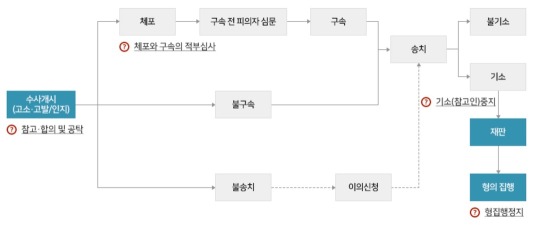
7 notes
·
View notes
Text
SBU foils Russian missile plot on Ukrainian military institute, arrests cadet collaborating with FSB

An 18-year-old military cadet has been charged with treason for allegedly aiding Russian special services, the Security Service of Ukraine (SBU) reported on Jan. 24.
The cadet, transferred to Lviv Oblast for training, reportedly communicated with a representative of Russia’s Federal Security Service (FSB) and provided sensitive information in exchange for monetary rewards.
According to the statement, the suspect transmitted data on the locations of military facilities, troop deployments, and the aftermath of shelling in the region.
“Law enforcement officers exposed her activities and prevented potential strikes on Ukrainian military positions,” the statement said.
She used a mobile messenger to send geolocations of training facilities and barracks, which were relocated from Kharkiv to Lviv following the full-scale invasion.
The FSB allegedly planned to evacuate her from Ukraine to Russia via a third country after the completion of her mission.
The cadet was detained by the SBU while attempting to send coordinates to the FSB and flee the military institute. During searches, officers seized a mobile phone and a laptop containing evidence of her collaboration.
The SBU revealed that the cadet planned to provide the FSB with the geolocations of official university buildings where other cadets, including her classmates, were staying.
She is currently being held without bail, and the court has imposed a preventive measure of detention under Article 208 of Ukraine’s Criminal Procedure Code.
The pre-trial investigation, conducted by members of the SBU Department in Lviv Oblast, is ongoing.
The charges under Part 2 of Article 111 of the Criminal Code of Ukraine carry a penalty of up to 15 years or life imprisonment, along with confiscation of property.
SBU detains metro engineer who allegedly directed Russian missile strikes on Kyiv, Kharkiv
The engineer allegedly led a network of agents who tracked the movement and positions of Ukrainian troops in order to coordinate Russian aerial attacks, the Security Service of Ukraine (SBU) said.

The Kyiv IndependentAbbey Fenbert

0 notes
Text
Gosh I think a musical about Sanzo Tsuda and the Otsu Incident would be really cool.
Nicholas II would open with a happy song about vacationing with his cousin and touring around Japan while also having undertones about how this a huge powertrip for him, getting to play in the culture of a country who is scared of him because of the military power he will one day inherit.
Cut then to Tsuda who would have a song about his slipping sanity with the chorus line providing haunting background vocals. The song would focus on his medals for heroism won in the Seinan War and how he would do anything to protect them. He then gets assigned to guard the streets that Nicholas II will go down and participates in a group number with Japanese reporters accusing the prince of coming to spy and speculating that the visit was a precursor to an invasion.
Cut to the actual incident which could be a reprise of all 3 of the previous songs with Tsuda and Nicholas singing back and forth and the haunting vocals emphasizing the same thing as Nicholas: that the Russians are subjugating the Japanese people. Tsuda then snaps and the attack happens in slow motion as a carefully choreographed dance number. Tsuda is taken into custody and Nicholas is taken to his hotel to be treated because he refuses a Japanese doctor.
Cut to then a huge group number to represent the 10,000 condolence telegrams sent by citizens and institutions that all melt away into a solo number by Yuko Hatakeyama in which she sings about the value of her life and how she hopes it can atone for Tsuda's act, ending with her suicide in front of the Kyoto Prefectural Office.
Next is another group number in which various lawyers argue about how to handle Tsuda's case. Some try to invoke Article 116 of the Criminal Code to execute Tsuda despite it not applying to a foreign crown prince while others argue for the actual charge of attempted murder which would carry life imprisonment at worst. The song is taken over by Kojima Iken, chief justice of the Supreme Court who fights back against his own cabinet and agrees on charging him with the actual crime, but does relent on trying Tsuda immediately instead of following procedure and allowing the case to make its way up the lower courts.
Tsuda gets another song in his prison cell where he laments his actions but at the same time questions whether he laments assaulting a complete stranger or merely laments doing it unsuccessfully. He wonders if he will keep his medals for heroism. Reporters arrive at his cell questioning the warden about his sanity, but are driven off and warned about the consequences of printing anything doubting that Tsuda was anything less than sane.
I feel like the court room scene to sentence Tsuda would have it's set set up and background music to make it seem like a musical number but instead its just a few quick lines sentencing him to prison for life.
Cut then to Nicholas being visited by Emperor Meiji where they sing a happy duet with the Emperor apologizing and Nicholas relishing it and promising to forgive him. Only once the Emperor leaves, he reveals that he will never forgive Japan.
Tsuda gets one last short song about how in less than a year, he's dying in prison and is still haunted by voices and wonders if he is still the hero he tried so hard to be. In his dying breath, he hopes that Japan will not be crushed by Russia.
This is followed with a reporter summarizing Nicholas becoming Tsar and advancing further east, forcing Japan to retaliate with the Russo-Japanese war, with Japan coming out victorious.
The final number would be Nicholas II during the Bolshevik revolution just before being executed. He would sing about how he did what he did for his family. How he thought he was invincible and thought he would leave his children an even stronger Russia than he had received. But all he had done was cost the lives of millions and had his family lose both Russia and their lives. And the stage would go black with his execution, ending the musical.
#long post#shut up zordon#otsu incident#Bolshevik revolution#should I tag this as Faberge eggs?#that is how I learned about this whole incident
1 note
·
View note
Text
Gonzalo Lira continued
KHARKIV APPELATIONAL COURD
UHWN
KHARKIV APPELATIONAL COURD
Case No. 638/5519/23 Chairman of Judge I Inststance Person_1
Proceedings No. 11-kp/818/1235/23 Judge Speaker Person_2
Category: Justification, recognition as legitimate, denial of the armed aggression of the Russian Federation against Ukraine, glorification of its participants
The X V A L A
IMENEM OF UKRAINE
On September 11, 2023, the panel of judges of the judicial chamber for criminal proceedings of the Kharkiv Court of Appeal consisting of:
Chairman - Person_2,
Judges - Person_3 , Person_4 ,
with the participation of the secretary - Person_5 ,
Prosecutor - Person_6 ,
accused - Lyr Person_7 ,
defender - lawyer Person_8 ,
Translator - Person_9 ,
having considered the open court session in the military.Kharkiv in the videoconferenceapeling complaint of the accused OSOBA_10 lawyer of the Personba_8 on the time of the investigative court of Dzerzhinskydistrict Court.Kharkiv from 04 August 2023,which is satisfied with the appeal of the prosecutor of Kharkiv Regional Prosecutor of the State of Ukraine_610 , INFORMATION_1 in criminal proceedings No22022200000018from 12.04.2022 of committed criminal offenses, predicted by Part 2st.436-2,part 3st 436-2CC of Ukraine,-
INSTALLED:
This decision was chosen to the accused Person_10 , INFORMATION_1, preventive measure in the form of detention for a period until October 02, 2023 without determining the size of the pledge.
Also, this decision was returned to the state income and credited to the special fund of the State Budget of Ukraine a pledge of UAH 402600, made by the accused on the basis of the decision of the investigating judge of the Kyiv District Court. Kharkiv from 01.May 2023.
In the appeal complaint, the defender of the suspected Personba_10 lawyer of the Person should ask the decision of the investigating judge to cancel and decide a new decision. How to leave a preventive measure in the form of a pledge that acted before the cancellation of it by the Dzerzhinsky District Court of M. Kharkov.
In justifying his appeal, the defender considered the decision so that it was adopted without taking into account the objective circumstances of the proceedings, mental and linguistic barriers for adequate perception of the situation by the accused, misunderstanding the latter of the principles of work and activities of law enforcement agencies and the court of Ukraine and such that it is made in violation of the requirements of the criminal procedural legislation of Ukraine. He believed that the qualification of the prosecution under Part 3rd. 436-2 of the Criminal Code of Ukraine is unfounded. He also said that according to Part 2nd. 32 of the Criminal Code of Ukraine is not a repeatable crime consisting of two or more committed at different times identical criminal acts united by a single criminal intention. Therefore, he believes that actions that are incriminalized by the Person_10 should be qualified as an continued crime. Along with this, it refers to the illegality of actions of employees of the USBU in the Kharkiv region, namely that the accused was detained two days before the time specified in the detention protocol. In addition, the defender noted that the materials of the proceedings do not contain any evidence that confirms the presence of risks provided for by paragraph. 1, 2, 5 h.1 p. 177 of the CPC of Ukraine, and the prosecutor in the court session did not prove their existence. At the same time, he referred to information characterizing the defendant’s identity, namely that he is a citizen of the United States and the Republic of Chile, not convicted, has a permanent residence in m. Kharkiv, strong social ties, married, has two young children in the maintenance of two young children. He also took into account the presence of mental and language barriers for adequate perception of the situation, misunderstanding of the latter's principles of work and activities of law enforcement agencies and the court, fear for his life and health, which he felt while in custody.
After hearing the report of the presiding judge, the arguments of the defense defense defense_8 and the accused OSOBA_10, who supported the appeal and asked her to satisfy, as well as the explanation of the prosecutor, who denied the satisfaction of the appeal and considered the decision of the court of first instance legal and reasonable, the panel of judges, examining the materials of the proceedings, checking the decision.
In accordance with the requirements of Article 177 of the CPC of Ukraine, the basis for applying a preventive measure is the presence of a reasonable suspicion of committing a criminal offense by a person, as well as the presence of risks that give sufficient grounds to the investigating judge, the court to believe that the suspect, the accused may take the actions provided for by part one of this article, that is: hide from the pre-trial investigation bodies and / or the court;criminal proceedings; prevent criminal proceedings in another way; to commit another criminal offence or to continue a criminal offence in which the suspected is accused.
In addition, when deciding on the election, the continuation of the preventive measure in the form of detention, the court should take into account the circumstances provided for in Article 178 of the CPC of Ukraine, in particular, the severity of a criminal offense, in the commission of which the person and the data that characterize him and may indicate in favor of increasing (decrease) risk of hiding from justice or other methods of improper conduct.
During the appeal, the panel of judges established that the decision of the court of first instance is justified and decided in compliance with these requirements of current and international legislation.
The panel of judges agrees to the conclusions of the court of first instance regarding the existence of the risks provided for in paragraph. p. 1, 2, 5 part 1 of Article 177 of the CPC of Ukraine, since the risk in the context of criminal proceedings is a certain degree of probability that a person will succeed in actions that will prevent the trial or create a threat to society.
In particular, the risk of escape should be assessed in the context of factors related to the nature of a person, his morality, place of residence, type of occupation, property status, family ties and all types of communication with the country in which such a person is subjected to criminal prosecution (Bekchiev v. Moldova ?58). The seriousness of punishment is a revalent circumstance in assessing the risk that the accused may escape ("Idalov v. Russia", "Hartyky v. Poland", "Country v. Germany", "Ilikov v. Bulgaria"), and the presence of criminalism may be grounds for justifying that the accused may commit a new crime ("Selchuk v. Turkey", "Matznetter v. Austria").
By assessing the possibility of the accused to hide from the court, destroy, hide or distort any of the things or documents that are essential to establish the circumstances of a criminal offence, commit another criminal offence or continue the criminal offence in which he is accused, the panel of judges takes into account that there is a certain probability that the latter may be in order to avoid the punishment.
According to information available in the materials of the proceedings, Lyr Personion_7 is accused of committing crimes provided for in the time. 2 st. 436-2, part 3 p. 436-2 of the Criminal Code of Ukraine, one of which is classified as a serious crime, the sanction of which provides for punishment in the form of imprisonment for a period of 5 to 8 years with confiscation of property or without such that the court of first instance reasonably referred to in its decision.
In the understanding of the practice of the European Court of Human Rights, the severity of the prosecution is not an independent basis for the detention of a person, but such an accusation, combined with other circumstances, increases the risk of escape so much that it cannot be turned away without taking a person into custody. In Iliyev v. Bulgaria, No. 33977/96 of 26 July 2001, the ECHR noted that “the severity of the imposed punishment is an essential element in assessing the risks of hiding or re-prolectioning crimes.”
In addition, the European Court of Human Rights has repeatedly stressed that there is grounds for detention to be assessed in every criminal proceeding, taking into account his specific circumstances.
According to the actual circumstances, the case of ISOBA_10 is not previously convicted, but it is charged with committing, including a serious crime provided for in Part 3 of Article. 436-2 of the Criminal Code of Ukraine, namely: the production and distribution of materials containing justification, recognition as legitimate, denial of the armed aggression of the Russian Federation against Ukraine, launched in 2014, including by presenting the armed aggression of the Russian Federation against Ukraine as an internal civil conflict, justifying, recognizing the temporary occupation of part of the territory of Ukraine as legitimate, and recognition of the temporary occupation of part of Ukraine.
In view of the above, there are sufficient and objective grounds to believe that there are risks that the accused Person_10 may hide from court, destroy, hide or distort any of the things or documents that are essential to establish the circumstances of a criminal offence, commit another criminal offence or continue the criminal offence in which he is accused.
According to the established practice of the European Court of Human Rights, the detention of a person can be justified if there are real signs of the presence of true public interest, which, despite the presumption of innocence, the principle of respect for personal freedom prevails. Applying a preventive measure in the form of detention, it is necessary to proceed from the fact that the court decision should ensure not only the rights of the suspect, but also high standards of protection of rights and interests of both society and the victim. The definition of such rights, as the European Court of Human Rights emphasizes, requires society to be more strict in assessing the values of society ("Letelier v. France").
In addition, according to the established practice of the European Court of Human Rights, the human right to freedom is fundamental, but not absolute and may be limited in view of public interest.
Given the specific circumstances of the crime, which is incrowned to the suspect, namely that he is accused of committing crimes that are classified as crimes against peace, the security of mankind and international law and order, the panel of judges considers that there is an public interest in this judicial proceeding, which is the need to protect high standards of protection of the rights and interests of society.
Along with this, as the court of first instance correctly noted, the accused has a passport of a US citizen and a passport of a citizen of the Republic of Chile, which expands the ability of a person to hide abroad, in different countries of the world in order to evade criminal liability.
Along with this, the Person_10 is married, but is in the process of divorce, has two young children, is not officially employed, a psychiatrist and a druglogist is not registered, there are no disabilities, any movable and immovable property in Ukraine does not have, lives in m. Kharkiv in an apartment that does not belong to him, that is, has the right to use, in Ukraine lives since 2017, children are citizens of Ukraine, live with their mother in m. Uzhgorod.
Along with this, it should be taken into account that the accused being under the action of a preventive measure in the form of detention with the introduction of collateral, voluntarily headed to the state border of Ukraine with Hungary. Being in the Transcarpathian region in the period from July 31, 2023 at August 1, 2023, the accused made a failed attempt to cross the state border at the checkpoint "ChOP" (Tisa).
Such information, beyond reasonable doubt, refute the accused's claims that he left m. Harle to his family.
Therefore, the accused’s attempt to cross the state border objectively indicates the existence of a risk of hiding from the court, and therefore the claim of the defense party to lack evidence of such a risk is unjustified.
At the same time, in a court session in the court of appeal, the defender said that after making a pledge, he personally explained to the accused the consequences of his violation of the duties assigned to him as a result of a pledge, and therefore the claim of the defense side about the inexplicability of the conditions regarding the more chosen preventive measure is unjustified.
Therefore, taking into account the above information in the panel of judges there is no doubt about the validity and proof of the risks that the prosecutor justified in the court of first instance and in the appeal proceedings, the need to apply such a preventive measure as keeping an ISOBA_11 in custody, since at the time of consideration of the appeal the risks that existed at the time of election of this preventive measure.
In such circumstances, the panel of judges agrees with the correctness of the conclusions of the court of first instance regarding the existence of established risks, and the same as the fact that the Personba_10 may hide from the court, destroy, hide or distort any of the things or documents that are essential to establish the circumstances of a criminal offence, to commit another criminal offence or continue the criminal offence.
Given the circumstances that are significant for this proceedings, according to the panel of judges, the court of first instance decided on the basis of comprehensively clarified circumstances with which the law associates the possibility of applying an exclusive preventive measure in the form of detention, while examining properly all the information available in the materials of the proceedings and gave in the decision the motives for which the relevant decision took.
In such circumstances, the panel of judges sees that the use of other, milder alternative precautions will not be able to ensure the fulfillment of his procedural rights and duties.
Taking into account this, the panel of judges reached a conclusion on the legality and validity of the decision of the court of first instance on the application of a preventive measure in the form of detention in respect of the Personion_10 without determining the amount of the pledge and the absence of any grounds for changing or canceling the decision under the arguments of the appeal of the lawyer of the Personion_8.
Guided by Art.177, 178, 404, 405, Art.407 part3 of paragraph 1, 418, 419 of the CPC of Ukraine, panel of judges,
In X V A L I LA:
The appeal of the defender of the Person should be left without pleasure.
The decision of the investigating judge Dzerzhinsky District Court of M. Kharkiv from August 04 2023 to leave unchanged.
To draw the attention of the prosecutor to the accused Lere Lopez Gonzalo Angel Kintilio on psychological pressure in the conditions of the SIZO, taking into account the presence of open criminal proceedings on the fact of the appeal of the defense party regarding illegal influence.
The decision of the Court of Appeal is not subject to appeal in cassation.
Heading -
Judges :
Date of decision making
10.09.2023
Posted
21.09.2023
0 notes
Text
Russian military officer reported on suspicion of intimidation and violence against Kherson region resident
Russian military officer reported on suspicion of intimidation and violence against Kherson region resident Under the procedural guidance of prosecutors of the Kherson Regional Prosecutor's Office, a serviceman of the Armed Forces of the Russian Federation was found guilty of violating the laws and customs of war (article 438 of the Criminal Code of Ukraine). via en.socportal.info
0 notes
Text
Ilya Yashin: See You Tomorrow in Court!
Ilya Yashin: See You Tomorrow in Court!
Ilya Yashin Tomorrow, September 7, the court will consider the complaint filed by my lawyers in accordance with Article 125 of the Russian Federal Criminal Procedures Code. We demand that the decision to launch a criminal case itself be ruled unlawful due to the fact that there is no evidence that a crime was committed.. The hearing will take place at 2:00 p.m. in [Moscow’s] Basmanny District…
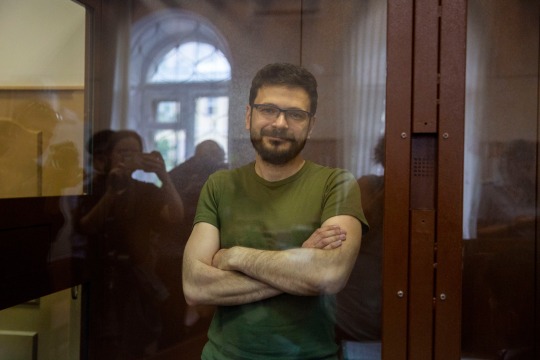
View On WordPress
#Basmanny District Court#discrediting the Russian Armed Forces#Ilya Yashin#Maria Eismont#Russian courts#Russian Criminal Procedures Code
0 notes
Text

Ukraine holds president of manufacturer Motor Sich for supplying engine parts for Russian helicopters
Fernando Valduga By Fernando Valduga 10/25/2022 - 08:16 in Helicopters, War Zones
Ukrainian security officers arrested the president of the manufacturer Motor Sich, Vyacheslav Bohuslayev, for "illegally" providing engine parts for Ka and Mi helicopters of Russian origin.
“The officers of the Security Service of Ukraine deted the President and the Head of the Department of External Economic Activity of JSC Motor Sich. They were notified of the charges under two articles of the Criminal Code of Ukraine: Art. 111-1 (collaboration); Art. 111-2 (helping and encouraging the aggressor state)," the Security Service of Ukraine (SBU) confirmed in a statement on October 23.
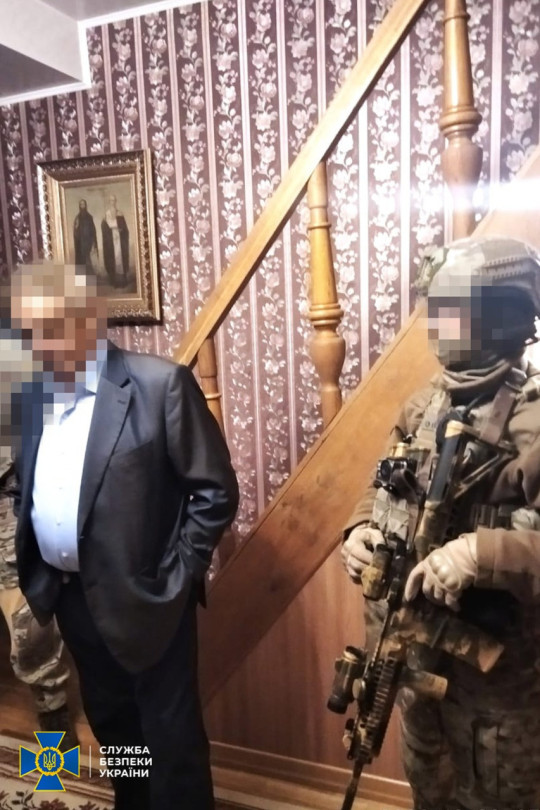
The agency said that the administration of the Zaporizhzhia-based factory acted in collusion with representatives of Rostec, controlled by the Russian state, which is close to the Kremlin. The accused ?? established transnational channels for the illegal supply of wholesale lots of Ukrainian aircraft engines to Russia. The products obtained from Ukraine were used to produce and repair Russian attack helicopters, such as the Mi-8AMTSh-VN Sapsan, the KA-52 Alligator and the Mi-28N Night Hunter, many of which were used ?? in the ongoing war.
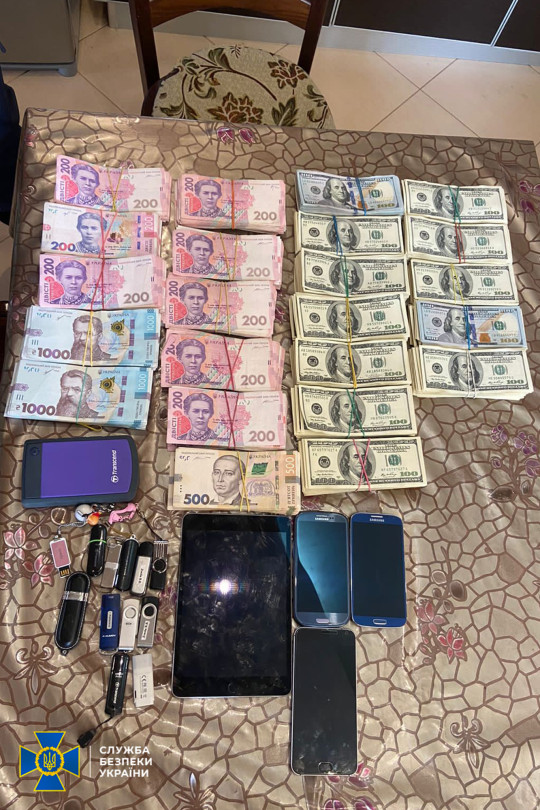
“To circumvent the restrictions established on trade with the Russian Federation, the organizers of the scheme used controlled commercial structures in three countries in the Middle East, Europe and East Asia. These companies sent the 'order' to the Ukrainian manufacturer supposedly for the needs of a foreign party. However, after receiving the military products, the "intermediaries" sent them to Russia. In addition, the enemy used his foreign accomplices to repair and maintain his aircraft with the use of Ukrainian spare parts," said the SBU.
The measures to expose and block the infractions were carried out by employees of the Department of Counterintelligence and the Main Investigation Department of the SBU under the procedural guidance of the Attorney General's Office.
On October 24, 2022, the SSU published a video containing alleged intercepted calls between Boguslaev and several Russian authorities made in recent years. In the calls, several helicopter engine transfer schemes to Russia are discussed to be used in Mi-8, Mi-24, Mi-28 and Ka-52 helicopters.
Some of the calls seem to have been made after the start of the invasion of Russia on February 24.
youtube
During one of them, Boguslaev allegedly says he "understands" Russia's reasons for bombing the Motor Sich factory in Zaporizhzhia. In another, he says that the latest engines of Motor Sich are ready to be mounted on new Russian helicopters.
Yet another recording allegedly documents Anatoly Sitnov, president of Russian engine manufacturer Vladimir Klimov-Motor Sich, explaining to Boguslaev a new scheme to transfer Ukrainian engines through Croatia, Kazakhstan and Kyrgyzstan.
Tags: HelicoptersMotor SichWar Zones - Russia/Ukraine
Previous news
OGMA is the first authorized heavy maintenance center for E2 E-Jets in Europe, the Middle East and Africa
Next news
Fleet of commercial aircraft from Latin America and the Caribbean will almost double in the next 20 years
Fernando Valduga
Fernando Valduga
Aviation photographer and pilot since 1992, he has participated in several events and air operations, such as Cruzex, AirVenture, Dayton Airshow and FIDAE. It has works published in specialized aviation magazines in Brazil and abroad. Uses Canon equipment during his photographic work in the world of aviation.
Related news
HELICOPTERS
Portugal will transfer Russian Ka-32A11VS helicopters to Ukraine
24/10/2022 - 16:00
HELICOPTERS
The training of the first U.S. Navy pilots in the TH-73A is underway
24/10/2022 - 11:00
MILITARY
Seen from the cockpit, insane video shows moment that Russian Su-25 jet is hit and pilot ejects
23/10/2022 - 17:32
HELICOPTERS
Argentina shows interest in the Dhruv, Prachand and LUH helicopters of the Indian HAL
23/10/2022 - 12:11
Russian Su-57 fighter. (Photo: Global Look Press)
MILITARY
Su-57 fighter stood out in attacks in Ukraine, says Russian commander
19/10/2022 - 19:00
ARMAMENTS
More HARM missiles in the new US$ 725 million aid package for Ukraine
17/10/2022 - 16:00
home Main Page Editorials INFORMATION events Cooperate Specialities advertise about
Cavok Brazil - Digital Tchê Web Creation
Commercial
Executive
Helicopters
HISTORY
Military
Brazilian Air Force
Space
Specialities
Cavok Brazil - Digital Tchê Web Creation
2 notes
·
View notes
Text
I got a strange request from someone in our Moot Court Society to make a summary of pertinent laws on self-incrimination from other countries. She’ll take the bar exams starting this Sunday. Apparently, the Bar Exam syllabus includes foreign laws on self-incrimination.
9 hours later, I’m reading the English translations of the Spanish Constitution of 1978, the Russian Constitution, the German Code of Criminal Procedure and the French Code of Criminal Procedure.
#dani the law student#bar exams#international law#foreign law#human rights law#self-incrimination#comparative law#russian constitution#spanish constitution#french code of criminal procedure#german code of criminal procedure
1 note
·
View note
Text
Criminal proceedings against citizens accused of taking part in the protests that rocked Kazakhstan in January 2022 are still ongoing, according to BBC News Russian. More than 5,000 criminal cases were opened in the wake of “Bloody January,” including ones against people who died in the unrest. The targets of these posthumous trials include six people who were killed in Almaty, two who were killed in Kyzylorda, and seven who were killed in Taraz. Kazakhstanis have termed them the “trials of the souls of the dead.”
One of the defendants in question is Shyngys Tastanbekov, who was 34 when he was killed. Investigators alleged that he took part in the protests and that four other suspects who also died during the unrest attacked the president’s residence and the city administration building. All five of them were convicted, and the ruling was upheld by an appeals court in June. The court did not hand down a sentence, citing the defendants’ deaths.
Zhaksylyk Dolda, the lawyer representing Tastanbekov’s family, has denounced the trial as political, citing procedural violations committed during the investigation phase. The prosecution’s “evidence,” for example, included video footage that showed Tastanbekov standing in a crowd. Under Kazakhstan’s Criminal Procedure Code, the prosecutors are required to show the video to the defense in its entirety, but the clips used to convict Tastanbekov had been edited. According to Dolda, nowhere in the video is Tastanbekov seen attacking any buildings or police officers.
Additionally, investigators did not commission any expert analyses of the footage to prove that the person it shows is actually Tastanbekov. The BBC noted that he was initially charged with terrorism and attacking government structures as well but that those charges were ultimately dropped due to a lack of evidence.
Tastanbekov’s relatives do not believe he committed the crimes he was convicted of. According to his sister, Shynar, the prosecution’s evidence is self-contradictory; among other things, some materials say that Tastanbekov was killed on January 5 outside of the president’s residence in Almaty, while others say his body wasn’t found until January 7 and was in a different location. Shynar also said one investigator asked the family to sign a confession statement confirming that Tastanbekov took part in the protests. When they refused, according to Shynar, the investigator threatened them. Shynar maintains that her brother did not participate in any riots or seizures of government buildings but simply attended a peaceful protest to help the other demonstrators “convey the people’s desperation to the authorities.”
In January 2022, the Almaty authorities opened a criminal case over Tastanbekov’s murder, but his death was never investigated, his lawyer told the BBC. According to Dolda, in the first examination of Tastanbekov’s body, a police officer noted that he had a through-and-through gunshot wound and burn marks on his lower leg, but the burn isn’t mentioned in the official forensic report. Dolda believes his client may have died while being tortured, but the court did not take this possibility into account. Kazakhstan’s Prosecutor General has acknowledged that security officials tortured some people who were arrested in connection with the unrest, and a total of 203 criminal cases were opened over alleged instances of torture and abuse of authority. To this day, it’s unclear who fired at protesters.
International human rights organizations have called on the Kazakh authorities to conduct an independent investigation of the January unrest, but Kazakhstan’s president, Kassym-Jomart Tokayev, has maintained that involving international experts is unnecessary. As of June 2023, only 12 people had been charged in connection with protesters’ death, according to the BBC. According to human rights advocates, more than 40 cases opened over protesters’ deaths have been dismissed or classified.
Seven other people who were killed during the protests have been convicted of participating in mass protests in the city of Taraz. According to journalist Yesdaulet Kyzyrbekuly, none of the suspects’ parents believe the authorities’ account of their childrens’ deaths. One of the people convicted, Andrey Opushiev, was 17 years old when he died. He died from a bullet wound after being shot in the back, and his jaw, teeth, fingers, and left leg were broken. Despite his family’s pleas, the authorities have not investigated his death.
25 notes
·
View notes
Text

Dear Anonymous,

I still have yet to play (or watch) DGS2, unfortunately, so we’ll have to save that part for another time, but I’d love to delve into the shared adventures of this adorable duo in the first game.
When Ryuunosuke first meets Susato, she’s nothing more to him than an ally in his defense in court.

He doesn’t see her again until he and Kazuma find themselves at the end of their rope.

It makes you wonder if she’s the one who founded whatever School of Interrupting at Just the Right Time so many Ace Attorney characters apparently went to, doesn’t it?
When she appears, “calm and dignified, in our desperate final moments,” to use Ryuunosuke’s words, she causes quite the stir. Luckily, the five minutes granted to her by the judge to present some crucial evidence is all she needs to help him and Kazuma pull off the first turnabout in Ace Attorney’s history.
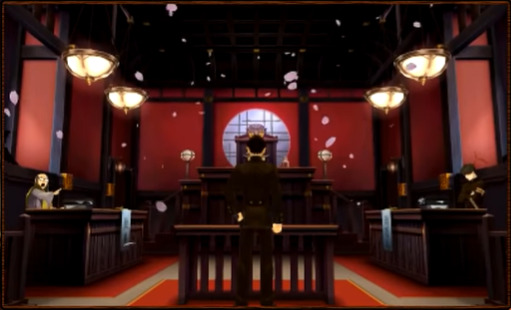
The mysterious legal assistant’s wish for Ryuunosuke’s good fortune was granted, apparently.
Thus Ryuunosu-- Um... Is it okay if I call him “Ryu” for short? Thus Ryu’s life was saved by a humble young woman who had the courage and decency to collect, summarize, and present the evidence that turned the case around in the nick of time. After leaving to finish his acquittal procedures with a humble bow, she disappeared, never to be seen by him again.
Or so he thought.
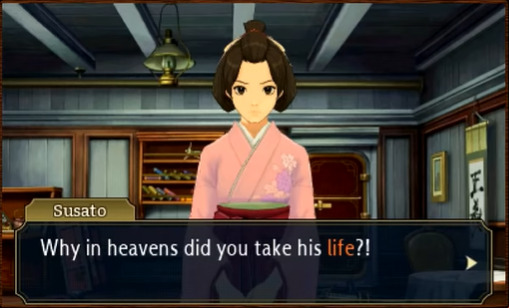
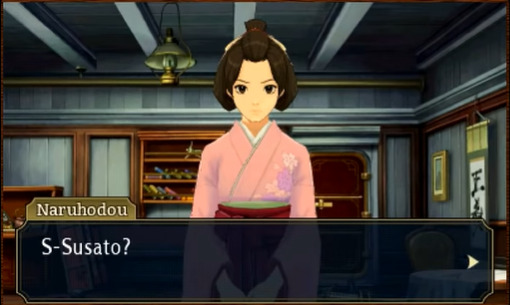
Similar to Phoenix and Maya’s first encounter, Ryu and Susato's second meeting occurs under the most tragic of circumstances. His close friend and classmate has been found dead in his cabin on the ship he managed to smuggle himself onto. Unlike Phoenix and Maya’s situation, however, it’s the lawyer (or soon-to-be lawyer) who is initially blamed for his death. To make matters worse, the young woman who helped to save his life isn’t feeling quite so compassionate this time around.
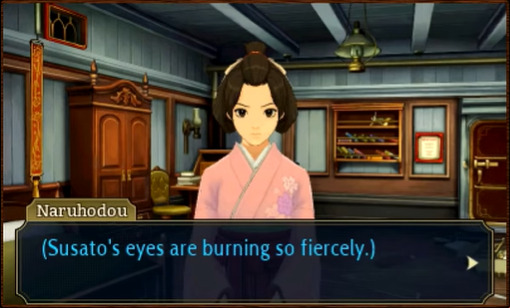
Her anger and distrust are understandable, considering that the evidence seems to point to Ryu as the culprit, on top of the fact that Kazuma was her foster brother. Luckily, she’s polite and reasonable enough to hear Ryu’s side of things, and even claims that she wants to believe him, so the two of them are at least able to treat each other civilly.
That is...until he tries to start investigating.

There’s a bucket load of energy beneath that demure countenance of hers, it turns out. Her move even has a special name -- the “Susato Toss.” Who would’ve thought she came straight out of Street Fighter?
Thankfully, she still has a reasonable side.

By presenting evidence of his innocence, Ryu not only vindicates himself, but finally starts to gain Susato’s trust.

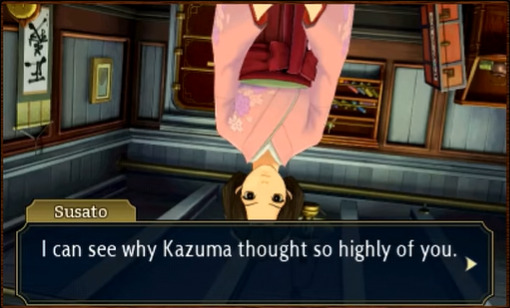
Sadly, her trust only lasts until a certain world-famous detective shows up to accuse Ryu of being a Russian revolutionary.

It’s hard to blame her, of course. Who wouldn’t trust THE Sherlock Holmes’s logic?
Nonetheless, her determination to find out more about Kazuma’s death is strong enough for her to begrudgingly continue the investigation with Ryu. One notable moment occurs here when he attempts to gain favor wither her by appealing to her love of mystery novels.

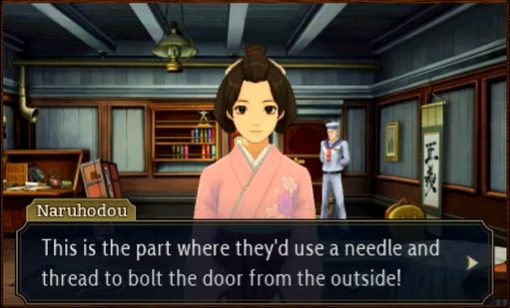
She’s no fool, of course, and only dislikes him even more for expecting her to fall for it.
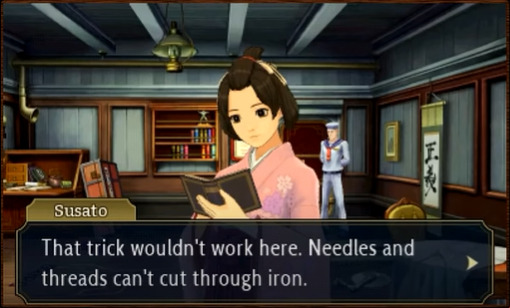
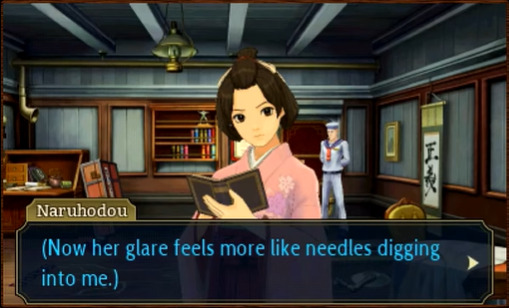
If I didn’t know any better, I’d say this was the “main characters don’t get along until they’re forced into a situation together” cliché. This situation may not fit that cliché perfectly, but it’s not too far off if you ask me.
When Ryu is finally allowed to investigate outside the cabin, Susato begins to show a bit more sympathy for him.


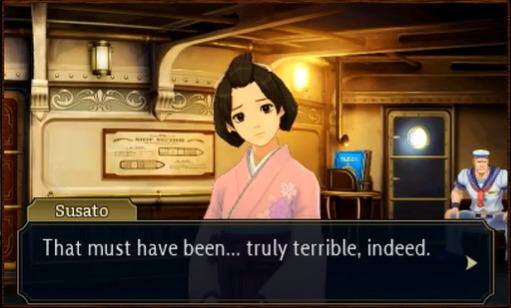
I have to give her some credit for that -- it takes a special kind of person to show compassion for a possible murderer. It also seems like she’s beginning to see Ryu as more of a human being than a heartless criminal. Baby steps, as they say.
From that point on, their dialogue begins taking on a more friendly tone. Thus Susato, whether on purpose or by fate, takes on the role of the first official assistant in Ace Attorney’s history. And boy, does she pull it off like a pro.

To make a long story short, their cooperative efforts combined with the ridiculous logic of a kooky detective (as well as the assistance of the less kooky Detective Hosonaga) bring them to the truth of Asougi’s death in the end. While this clears Ryu of the crime and offers some much-needed closure for both him and Susato, his death still affects them deeply.
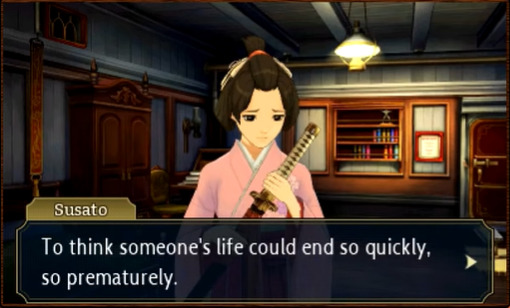
Something wonderful stems from this tragedy, though -- a crucial moment, not only for the two of them, but also for the Japanese and British Empires.

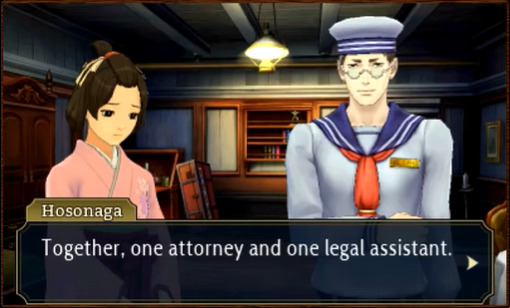
With Asougi’s passing, the exchange program between Great Britain and Japan is forced into suspension, unless, somehow, a replacement attorney can be found before the ship reaches London.

It’s a shame it has to end this way after all they’ve been through together, but that’s just the way it goes someti--

...Oh. Well, then. Who would’ve seen that coming? (Besides us, I mean.)
And strangely enough, the young woman who once saw Ryu as a cold-blooded murderer has this to say about him becoming an attorney:

Thus a new attorney/assistant pair arises from the ashes of one attorney’s passing (pun fully intended), and the two of them step into a new journey in their lives together. And thankfully, it wasn’t exactly the cliché it appeared to be -- the two of them are now trusted friends, and Susato even offers to let Ryu toss her three times as punishment for not believing him. (It doesn’t quite end that way, but that’s beside the point.)
The first leg of said journey takes place in the “centre of the world” the incredible city of London. What a place to begin, am I right?


Thus their incredible legal adventure begins (or adventures begin, I should say) in beautiful Victorian Era Britain. To describe their encounters here briefly (and so I don’t spend a whole year on this essay), they learn together how the British court system works...

...about its imperfections...
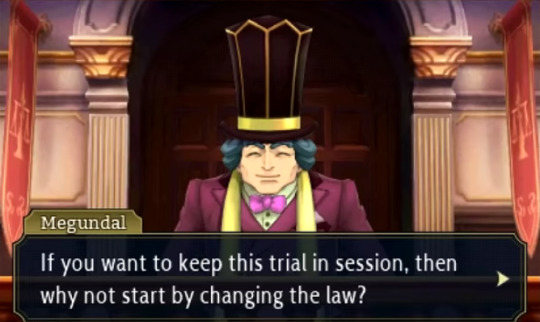
...how it feels to pull off a turnabout in a British courtroom...

...and perhaps most importantly, about the value of trust.
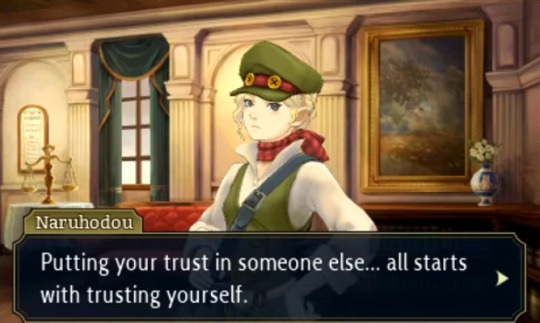
To say nothing of their misadventures with Mr. Holmes, his young genius assistant, and several other unforgettable British folk.
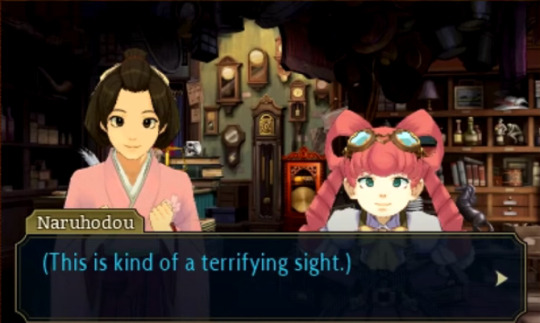
And a fellow Japanese immigrant, too, of course. Who could forget him?

You know, I’m starting to wonder if he might be one of Larry’s ancestors.
The game throws one final curveball for the great legal duo before it ends. After telling Susato she’s the world’s best legal assistant, Ryu gets a very unexpected response from her:
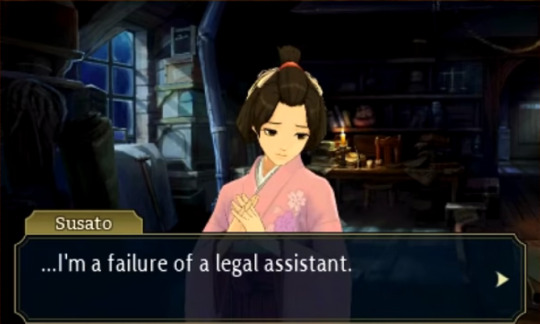
When he attempts to confront her about it, all he gets is another Susato Toss.
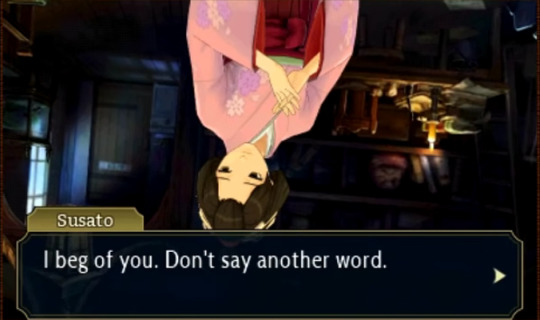
What could someone like her, who’s already proven her worth as a legal assistant several times, be hiding? Unfortunately for Ryu, he’s unlikely to find out soon, since her father’s illness has called her back home, leaving him to pull off his next turnabout on his own. She doesn’t go without leaving behind as much helpful evidence as she can muster, of course.
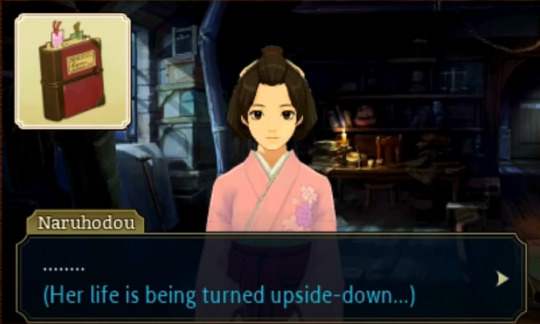
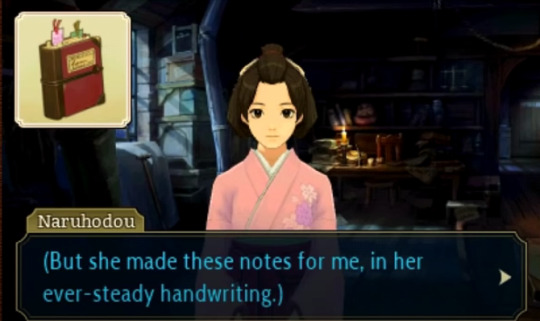
But, as fate would have it, a storm prevents her ship from departing for at least half a day, giving Ryu and his new flatmates a chance to see her off. On top of that, it gives Ryu the chance to find out precisely what inspired Susato’s words of doubt.
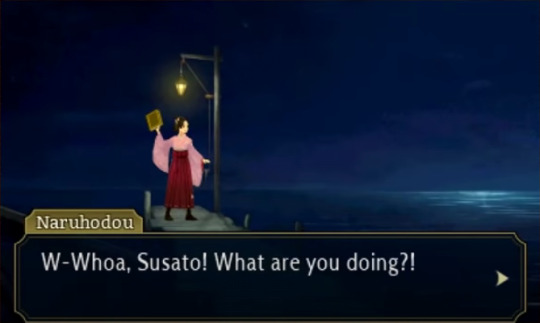
He catches her preparing to throw a copy of the British Empire’s Code of Law into the sea. What would cause her to do such a thing?
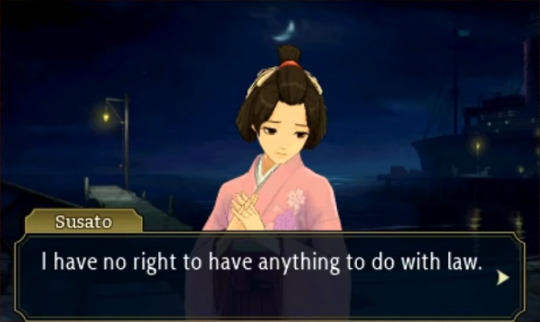
It turns out she broke one of the rules by tampering with the scene of the crime, and another by concealing that fact. Her intentions may have been good, but her conscience became a little too heavy for her to let it go. She takes it a step further by claiming that, for one moment, she began to doubt the law.

She may not be wrong in stating this (she learned it firsthand in the British courts, after all), but it still caused her to see herself as a failure of a legal assistant. Luckily for her, though, Ryu had learned some things himself in the time they spent together.
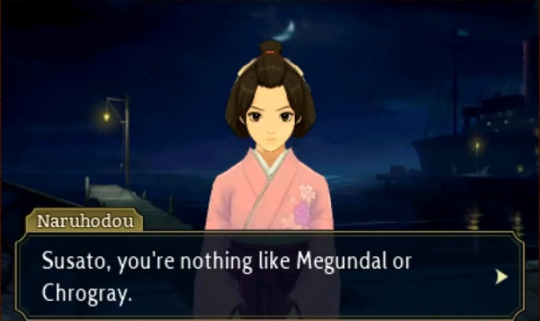
While her methods were questionable at best, Ryu recognizes something in Susato that sets her and every just person apart from a criminal: a desire to protect the innocent. Whereas Chrogray used her tampering as a way to protect himself, her only desire was to protect Gina’s life and to ensure that Ryu would be able to prove her innocence in the end. In other words, her faith in the system may have been lacking, but her desire for justice, like Ryu’s, never faltered for even a moment. With that knowledge in mind, the two of them can part with a better knowledge of the law, a better understanding of each other, and smiles on their faces.

So, to sum it up, Ryu and Susato go from being friendly acquaintances, to a murder suspect and suspecter (for lack of a better word), to investigative partners, to full-fledged legal partners, and finally, to a legendary legal duo. Will their relationship ever go any further than that?

Also, full disclosure -- it’s been a long time since I watched Dai Gyakuten Saiban, so I had to do a hefty amount of re-watching in order to remember some of these details...hence why this essay took so long. Thanks for waiting!
And hey, how’s that for good timing?

Don’t know about you, but I’m eagerly looking forward to revisiting this unforgettable saga. And, y’know...doing it the proper way instead of depending on fan translations.
-The Co-Mod
19 notes
·
View notes
Text
Soviet tradition of punitive psychiatry continues in Russia-occupied Crimea
Soviet tradition of punitive psychiatry continues in Russia-occupied Crimea #LetMyPeopleGo #FreeDzhelyal
There is no basis for moving Nariman Dzhelyal to the psychiatric hospital. This is not the opinion of his lawyer but the provisions of Russian legislation. Now, a bit of law to elucidate the point. Under Article 196 par. 3 of Russia’s Criminal Procedural Code, the psychiatric expertise of the defendant is a must when there is doubt that she is sane or able to independently defend her rights and…
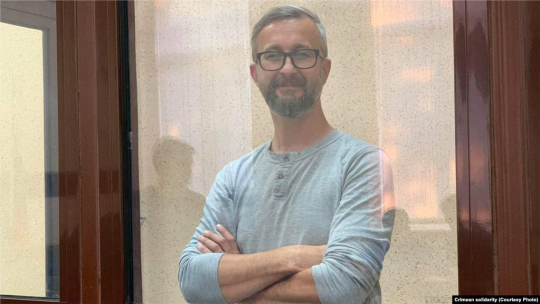
View On WordPress
3 notes
·
View notes
Text
Helfert, Joachim Murat, Chapter 7
Helfert adds a brief last chapter about what happened after Murat’s death; it is more of an epilogue, actually.
7. Murat's Heirs.
The Prince of Canosa was in Castrovillari on October 14 when news arrived from Pizzo that all was over, whereupon he changed his mind and returned to Naples. At court, too, the outcome was already known. On the evening of the 14th, the news was telegraphed to the king, who immediately went to Princess Partanna, where Count Mocenigo was visiting. Through the latter, who visited our envoy in his theatre box, Jablonovski heard about it the same evening. The next morning Circello issued a circular to the foreign legations with a brief announcement of the event, the details of which were not yet known. The news caused almost undivided consternation in these circles, but this did not prevent Ferdinand IV from holding a ball at his Favorita that same evening, as he regularly did every Sunday, and from discussing the catastrophe of Pizzo with the foreign diplomats to the cheerful sounds of music and lively dances. Truly, the peasant's son from Bastide-Fortunière had, when he was informed of the death of his mortal enemy Maria Karolina in the distant Hegendorf, shown more tact and royal decency than the purple-blooded Ferdinand at the news of his chivalrous adversary's sad end. On the 17th, Luigi de' Medici, in his capacity as temporary Minister of Police, gave a detailed report on the course of events of Murat's enterprise and on the reasons for the sentence passed against him, excerpts of which were reported to the public two days later in the government newspaper.
Around the same time, the king received an address of homage and devotion from the citizens and another from the cathedral chapter of Pizzo. They received everything they asked for and could only wish for. The town of Pizzo was given the title of "most faithful", its syndici, elected and deputies were awarded a golden medal - obverse: bust of Ferdinand, reverse: "Ob egregiam urbis Pitii fidelitatem; postridie nonas octobris MDCCCXV" - for ever. The municipality was granted freedom from all taxes and consumption duties for now and forever, its inhabitants were to be supplied with the salt they needed, and its unfinished cathedral was to be expanded at royal expense. Finally, it was decided to erect a monument at the place where Murat had been overcome and captured, which would bear witness to the event and the royal favours attached to it for posterity.
Ferdinand was not entirely without concern as to what friendly courts would say to his having taken such a decisive step without first consulting their representatives. The King and his First Minister thought they had all the more reason to be uneasy about this point, as both Jablonovski and Mocenigo made somewhat long faces, and thought their cabinets would not easily get over this disregard. The Russian envoy in particular, wherever the event was mentioned, spoke in such an intemperate manner that the King was seriously displeased. Only A'Court spoke in just the opposite sense: The case of Murat was so glaring that the proceedings of the court were completely justified; he was convinced that his cabinet would agree with him. Jablonovski, too, had to admit on the whole that Ferdinand could not have acted otherwise; that the armed invasion and the expressed intention of dethroning the king and revolutionising the country demanded strict and swift justice; he was convinced that if Ferdinand, in order to await the consent of the allied powers, had allowed his prisoner to be taken into the interior of the country, the Muratists would have mustered all their forces, would have set in motion all means to arouse an insurrection in their favour and, in any case, would have involved and exposed a multitude of persons, since, on the other hand, all further mischief was now prevented by the death of one man.... .. Nevertheless, Jablonovski, at least it seemed, was not sure how the Allies would judge the event, shrugged his shoulders at Circello, did not conceal his fears from the King that such a hasty procedure would be perceived as a lack of consideration for Ferdinand's high allies, and so on.
But the answer that arrived from Paris was quite different. It was more of a rebuke, with which the Prince-Chancellor instructed his Neapolitan envoy that he should not have become involved in this matter in the first place, but should have acted as an uninvolved observer. Attacked in His States," said the despatch dated November 4, "by a party leader whose royal dignity he had never recognised and who came bearing arms to incite his subjects to rebellion, to light the torch of civil war and to threaten the tranquillity of Italy, the King was allowed to consult no one but His and His country's interests, to which he would undoubtedly have done harm if he had first consulted with his allies as to the fate fully deserved by Murat, who, by the audacity of his punishable enterprise, had placed himself outside the law." The Austrian passport that Murat had in his hands did not therefore place him under Austrian protection; for the bearer had made a different, indeed criminal, use of it than that for which the document was intended. At the moment when he preferred to take a foolhardy risk, he had renounced the protection and the benefit which Austria had intended for him, etc. ... Since Metternich only formulated his decision after he had consulted the representatives of the allied powers in Paris, it was actually to be regarded as a statement by the latter and was addressed not only to Jablonovski but just as well to Mocenigo, and in general to all those who had made themselves important in this matter ...
Only now did King Ferdinand IV of Naples and Sicily, or as he soon called himself following the example of the Napoleonids, "Ferdinand I of Both Sicilies", sit firmly on his throne, unchallenged on all sides. His former adversary and tormentor of Palermo, Lord William Bentinck, did appear once more in his capital, but only to collect his lady, with whom he returned to Rome. The vexatious negotiation which had taken place between him and Earl Nugent in the last days of September had been badly noted by Bentinck's ministry. The machinations and quarrels, from which he had not wished to desist even then, when he no longer had a command or an office to interfere in the affairs of Italy, had caused his government more than one embarrassment, wherefore it now sent him the well-meant advice to depart without noise from a scene in which he had made so much talk of himself throughout a lustrum.
In no. 158 of the "Giornale delle Due Sicilie" of 23. November, two decrees were published, dated the 6th, signed by the King and countersigned by Tommaso di Somma: one to Alvaro Ruffo, who was awarded the title of Prince, a seat and a vote in the Council of State, the Grand Cross of the Order of Ferdinand and a pardon of 6000 ducats a year for his persevering loyalty to life, for his many services, but above all for bringing about the Austro-Napolitan alliance treaty, "diretto a discacciare l'usurpatore Murat"; the other to Serra-Capriola, who was likewise awarded the Grand Cross and an annual pension of 2000 ducats. The first letter, which was written in a particularly warm manner, was, as Jablonovski reported to Vienna, "largely edited by the king himself", just as Ferdinand in general, ever since Maria Karolina was not at his side, intervened more in business, had especially important coded dispatches from his envoys addressed directly to his person, etc. His ministers sometimes only learned the contents the next day, whereas the Princess of Partanna knew how to find out the secret before they did. As is well known, she had to promise her royal lover, before he took her to the altar, not to interfere in affairs of state; but our envoy doubted whether this relationship would last long; in time, he thought, she would gain it over the king and break the fetters he had put on her.
It remains to add a word about the fate of Joachim Murat's companions on his last journey; one of them, Domenico Franceschetti, has reported on it in detail.
After the ex-king had disappeared from the scene, Ferdinand granted his supporters mercy for justice. On 27 October, they were taken from their place of detention to the island of Ventotiene, where they were joined by a hundred other Muratists, the crew of two other barques, who had been carried by the storm to the coast of Calabria citeriore and captured by Ferdinand's troops. On 17 January 1816, after receiving complete amnesty from the King at the presentation of the Minister of War Saint-Clair, they left the small island and, after all sorts of unpleasant perils, arrived at Porto-Ferrajo and then on to Livorno, where they appealed to the Grand Duke of Tuscany for an asylum. Count Narbonne had assured them from Naples that his king would not be outdone in magnanimity by Ferdinand IV, whereupon they sailed for Corsica. Here the Marquis de la Rivière, who had already proved so spiteful against Murat in Toulon, intervened and now received his followers only to have them arrested and put in chains. Even their relatives, especially Franceschetti's family, where one suspected hidden treasures of the ex-king, were treated inhumanely, so that in some parts of the island ferment arose and even riots broke out, which were bloodily suppressed until Rivière was succeeded by the more conciliatory Gen.Lieut. Willot. Nevertheless, the Muratists were continually treated as prisoners, brought from Corsica to Marseilles and imprisoned in If Castle, where the officers in particular, eighteen in number, had to endure a very hard time. The soldiers, on the other hand, were released from their bonds at the beginning of June and assigned to different troop bodies.
In the first days of August, five of the officers, including Franceschetti, Natali and Ottaviani, were transported to the prison of Draguignan, in the Var department, where they were to answer to the Prévôt court, which declared itself to be without jurisdiction. After many representations, letters of justification, petitions for clemency, an order from the Minister of Police, Décazes, dated 6 January 1817, finally opened the doors of their dungeons, whereupon they received permission to return home on 16 February.
And what became of Captain Barbara, who rascally or cowardly abandoned his king and lord, to whom he owed everything he was and had, in the moment of need? Franceschetti no longer mentions him, and elsewhere I have found nothing about him.
1 note
·
View note
Text
от ЛГБТ группы "Стимул"
СКР отказался проводить проверку по заявлению трансгендерной девушки, ставшей жертвой полицейского вымогательства
Следователи перекладывают дело на плечи отдела собственной безопасности МВД, а там в свою очередь отписывают материалы следователям. Понятно одно: никто в ближайшее время расследование проводить не намерен.
Ясмина В., гражданка Кыргызской Республики, является трансгендерной девушкой, проживает в Москве. В мае 2020 года Ясмина обратилась за помощью в группу «Стимул», рассказав следующее.
Вечером 11 мая 2020 года она поехала на свидание с мужчиной, с которым познакомилась в сети Интернет. Свидание оказалось подставным, а новый знакомый, как полагает девушка, оказался полицейским. На месте встречи Ясмину встретил наряд полиции, который ее задержал, довез до полицейского участка, где девушке начали угрожать тем, что, если она не даст им взятку, ее депортируют из России и закроют въезд обратно.
В итоге сотрудники полиции продиктовали Ясмине реквизиты какой-то женщины, которой в итоге и были переведена требуемая сумма - 15 000 рублей. После этого Ясмину отпустили.
Получение денег за совершение действий или бездействие в пользу взяткодателя, если указанные действия (бездействие) входят в служебные полномочия должностного лица, является должностным преступлением и карается согласно ст. 290 УК РФ. Кроме того, в действиях полицейских могут содержаться признаки преступления, предусмотренного ст. 286 УК РФ, а именно превышение полномочий.
В этой связи, с помощью юристов «Стимула», Ясмина обратилась с заявлениями о преступлении в Следственный комитет РФ, который призван расследовать дела в отношении полицейских, а также в отдел собственной безопасности МВД, который следит за законностью действий сотрудников внутри ведомства. И вот, с интервалом в несколько дней, мы получили ответы из обоих ведомств, из которых следует, что разбираться с произошедшем ни в СКР, ни в ОСБ не настроены. Следком, игнорируя нормы Уголовно-процессуального кодекса, самоустраняется и просит провести служебную проверку в рамках полицейского ведомства (хотя такая проверка во-многом лишена независимости), а ОСБ передает материал в СКР, хотя и вправе привлечь сотрудников к дисциплинарной ответственности, вплоть до увольнения.
from LGBT group "Stimulus"
TFR refused to conduct verification on the statement of a transgender girl who was a victim of police extortion
Investigators shift the matter to the shoulders of the department of internal security of the Ministry of Internal Affairs, and there, in turn, they write the materials to the investigators. One thing is clear: no one intends to conduct an investigation in the near future.
Yasmina V., a citizen of the Kyrgyz Republic, is a transgender girl, lives in Moscow. In May 2020, Yasmina turned for help to the Stimulus group, saying the following.
In the evening of May 11, 2020, she went on a date with a man whom she met on the Internet. The meeting turned out to be fraudulent, and the new acquaintance, as the girl believes, turned out to be a policeman. At the meeting point, Yasmin was met by a police detachment, which detained her and drove to the police station, where the girl was threatened that if she didn’t give them a bribe, she would be deported from Russia and her entry would be closed.
As a result, the police officers dictated to Yasmine the details of a woman who, in the end, was transferred the required amount - 15,000 rubles. After that, Yasmin was released.
Receiving money for committing actions or inaction in favor of a bribe-giver, if the specified actions (inaction) fall within the official powers of an official, is an official crime and is punishable in accordance with Art. 290 of the Criminal Code. In addition, the actions of the police may contain signs of a crime under Art. 286 of the Criminal Code, namely the abuse of authority.
In this regard, with the help of Stimul's lawyers, Yasmina filed a statement about the crime with the Investigative Committee of the Russian Federation, which is called upon to investigate cases against police officers, as well as with the department of internal security of the Ministry of Internal Affairs, which monitors the legitimacy of the actions of employees within the department. And so, with an interval of several days, we received answers from both departments, from which it follows that we are not configured to deal with the incident either in the TFR or in the RSD. Therefore, ignoring the norms of the Code of Criminal Procedure, he resigns himself and asks for an internal audit within the police department (although such an audit is largely deprived of independence), and the OSB transfers the material to the TFR, although it has the right to bring employees to disciplinary liability, up to and including dismissal.
#biseuxal#lgbtq#??????? ???????#lgbt art#lgtb#????#права лгбт#лгбткиа#лгбтроссия#лгбт сообщест��о#лгбт#лгбт блог#лгбт подростки#русские блоги#русский блог#русский тамблер#русский текст#русский tumblr#украина#украинка#український tumblr#український блог#украинский пост#беларуси#беларусь#беларускі тамблер#подростковый блог
5 notes
·
View notes
Photo

Five Time’s the Charm Ilya Yashin is not the only unregistered candidate for the Moscow City Duma against whom the tactic of consecutive arrests has been used.
#2019 Russian elections#administrative offenses#Anastasia Kornya#arrest#consecutive arrests#Defense of Protest#disqualification#Dmitry Gudkov#Ilya Yashin#independent candidates#Ivan Zhdanov#jail#kangaroo court#Konstantin Yankauskas#Moscow City Duma#Oleg Stepanov#political crackdown#Russian Criminal Procedures Code#Russian police state#Russian Supreme Court#Vedomosti#vote rigging#Yulia Galyamina
0 notes
Text
The military salute
So I was having dinner with a dear American friend who I have mentioned before in a previous post on the British evacuation of Dunkirk I think. He was Exeter and Harvard educated before a stint in the US Marines Corps and now living and working in Paris. As always we get into interesting diversionary conversations about our comparative military experience. Somehow the issue of saluting came up.

He said that when he was growing up he was always told by family that showing the palm is a sign of subordination and submissiveness, and that only a military who has lost a war salutes with palm up. So he was surprised the first time when he received a salute from a passing British army soldier at some military event.
This is obviously untrue but it’s a mystery how that view persisted.
It’s true that both Britain and the US salute differently as do other nations. A soldier will never notice the way he salutes to a superior officer or on formal occasions (like raising the flag) until he/she were thrown in with other officers and soldiers of other allied countries to see the differences.

The origin of the military salute
As with many protocols, there’s a secret language to the salute and different expressions of the act of saluting. At the very basis of the salute is something worth pondering at a time when the public debate is trying to sort out what kind of accommodations ought to be made at citizenship ceremonies.
The salute is thought to have originated as a method of demonstrating benign intention. The story goes that public officials in ancient Rome required people approaching them for an audience to raise their right hand to show that they weren’t concealing a weapon. I would imagine it was a field day for left-handed assassins.

The truth is the origin of the military salute is uncertain.
A possible explanation has its origin in the Middle Ages,
Knights adopted a method of assuring other travellers that they meant them no harm. This assurance was transmitted by the raising of the visor on a helmet. Typically, the right hand would rise and lift the metal shield so that the face could be viewed. The right hand was used as it demonstrated that the weapon hand was engaged; the left hand was occupied holding the reins. In time, visors would be modified to have a small metal projection that could be easily lifted to effect this salutation.

This practice evolved to become what we know as the salute: Salute derives from both the Middle English and Old French meaning respectful greeting. You were, in essence, showing yourself.
The simple act of saying, “Hey, it’s just me; nothing to worry about here,” became the way that people in official capacities acknowledged one another. The military adopted salutes as a method of conveying respect and order. Each country found its own unique expression of this message.
However there is a drawback to having this explanation is that if the military salute had a medieval origin, it would have been used to a greater or lesser extent for centuries, but the reality is that it is a rather recent salute, which extended into the Contemporary Age.

Another explanation, more likely, points out that centuries ago there was a habit of saluting a superior by raising his hat. In the 18th Century the ordinances of the British Army suppressed the obligation to uncover the head to greet a superior. Instead, the custom of grabbing the end of the hat was established as if one were to remove the hat, a gesture that would have given rise to the military salute we know today.
Perhaps that explains a detail: as a general rule, in almost all armies, soldiers are exempt from military salutes if they do not wear any headgear. a British order book from 1745 dictates “men are ordered not to pull off their hats when they pass an officer, or to speak to them, but only to clap up their hands and bow as they pass.”

The two main types of military salutes
Currently, and with a few exceptions that I will point out below, in the world military salutes are divided into two main types: with the palm down and with the palm forward. The salute with the palm down consists of raising the arm leaving it at right angles to the body, then stretching the forearm toward the right temple, with the hand extended and the palm of the hand facing the ground.
This salute is the one used in the armed forces of the USA, Russia, China, Spain, Portugal, Italy, Germany, Austria, Belgium, the Netherlands, Ireland, Turkey and practically all the countries of Central and Eastern Europe and in all the countries of Central and South America, and also in the naval forces of the United Kingdom and the Commonwealth: Australia, Canada, New Zealand, India, Pakistan and others.
The other most usual military salute is with the palm in front. The procedure is the same as with the palm down, with the difference that in this case the palm of the hand is left facing the front and perpendicular to the ground. This military salute is used in France (where it is called “raquette”) and in many of its former colonies. The open palm salute is more identifiable in the public imagination (thank you Hollywood) with the armies and air forces of Britain and the Commonwealth countries including Australia, Canada, New Zealand, India, Pakistan and other ex-colonies.

The origin of the American armed forces
According to the Armed Forces History Museum, today’s standard salute - right hand touching the brim of the head cover with the palm down - was in place by 1820. The museum says the palm down portion of the salute may have been influenced by the salute style of the British Royal Navy at the time.
Why did the Americans follow the British Royal Navy? The US copied the British naval salute because they would more commonly encounter the British navy than the British army. So that's the one that got copied; thus the prevalence of palm down salute in the American military.
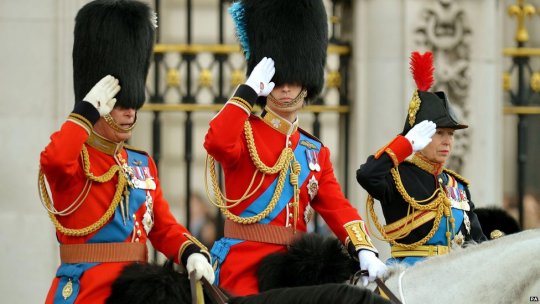
The origin of the different salutes in the British armed forces
Already stated above, in the United Kingdom and in the Commonwealth countries the two salutes are used: with the palm down in the case of the Royal Navy, and with the palm in front in the rest of the army and Royal Air Force.
What is this about?
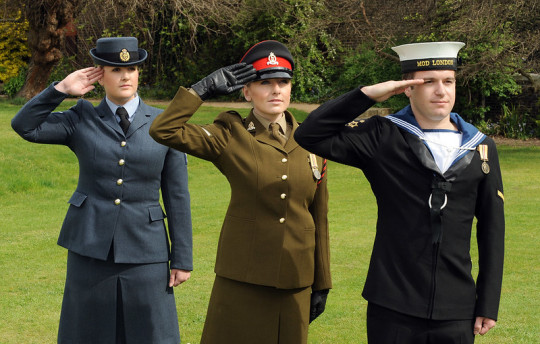
There is an anecdote that could explain it: on one occasion Queen Victoria visited a warship and a sailor greeted her with his palm in front, his hand rather dirty. The Queen had then decreed that the crew salute with the palm down, because by the work of the ships, it was more frequent that the sailors had their dirty hands and it was bad to salute like that.

The Polish military salute with two fingers
One of the most peculiar military salutes is the Polish, known there as “salutowanie dwoma palcami”, that is, salute with two fingers. The name is because the salute is done as in other nations, but extending only the index finger and the middle, and bending the ring finger and little finger, closing them with the thumb.
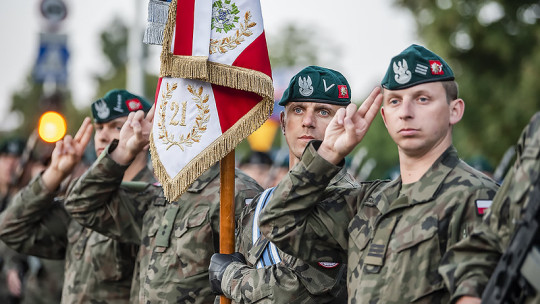
The Polish salute has another peculiarity: the main purpose of the salute is to point out the white eagle, the national emblem of Poland, which is why Polish soldiers always wear the eagle in their headwear – with some exceptions – on the front in the center, even when wearing a beret. Currently, the Polish salute is done like French, that is, with the palm facing forward.
Perhaps the custom of saluting with the palm to the front extended in the Polish Army because many soldiers of that country ended up fighting framed first in the French Army and then in the British.
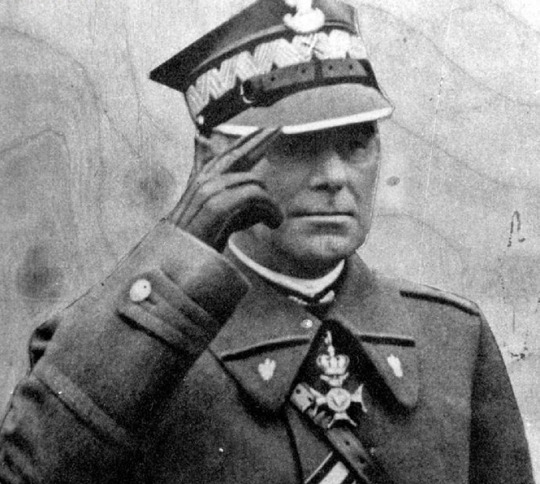
Incidentally, the Polish two-finger salute caused some complaints of British officers during the Second World War, as they considered it a lack of respect, as he thought that the Poles were giving them the Boy Scout salute (which is identical to the Polish, but extending three fingers instead of two). For this reason, the Polish soldiers in the British Army used to make the British salute with the palm in front, at least in the presence of British officers.
The origin of the Polish salute is as uncertain as the rest of the military salutes. The most common legend in Poland locates its origin in the Napoleonic Wars, when a military courier was hit by shrapnel, in spite of which he fulfilled his mission and when arriving before Prince Józef Poniatowski, he greeted him with the three remaining fingers of the hand, dying later. Poniatowski, admired by the bravery of the soldier, would have adopted the military salute for the Polish forces. However, other sources indicate that the salute did not appear until 1863 and would be of Russian origin, being adopted by Marshal Józef Piłsudski after the recovery of Polish independence in 1918, at which time the two-finger salute was made official.

The Albanian chopping salute
Known as the Zogist Salute. King Zog the First of Albania came up with a salute that is executed by placing your hand over your heart with your palm down with a sort of chopping motion.
The Zogist salute is big in Mexico and South America. Our RCMP salute in the manner of the British military, with the palm forward. In Germany, the reviled “heil Hitler” straight-arm salute can land you in jail for up to three years under their current criminal code. Rising from the fact that so many pilots were trained in the air force, airline ground crew tend to salute the pilots of outgoing flights.

Saluting tradition
There are so many ways of communicating via gestures enshrined in tradition: the handshake, the tip of the hat — all intended as acts of friendship. None of the salutes imply obeisance; each is designed to convey respect. In the British tradition, a salute isn’t for the individual but acknowledges the royal commission of the individual: it’s the job, and not the person, who’s being saluted. And the respect is always reciprocated with the salute being returned.
There’s more in a salute than you might think. Their initial impulse was to offset trepidation and inspire confidence; literally and figuratively, to disarm. The gesture went on to indicate respect everywhere from service people at arms and even the Boy Scouts. But the convention of showing oneself to defray concern and offer assurance is genuine and ancient and widespread. There is something in us that wants to see the hand and the face.
52 notes
·
View notes